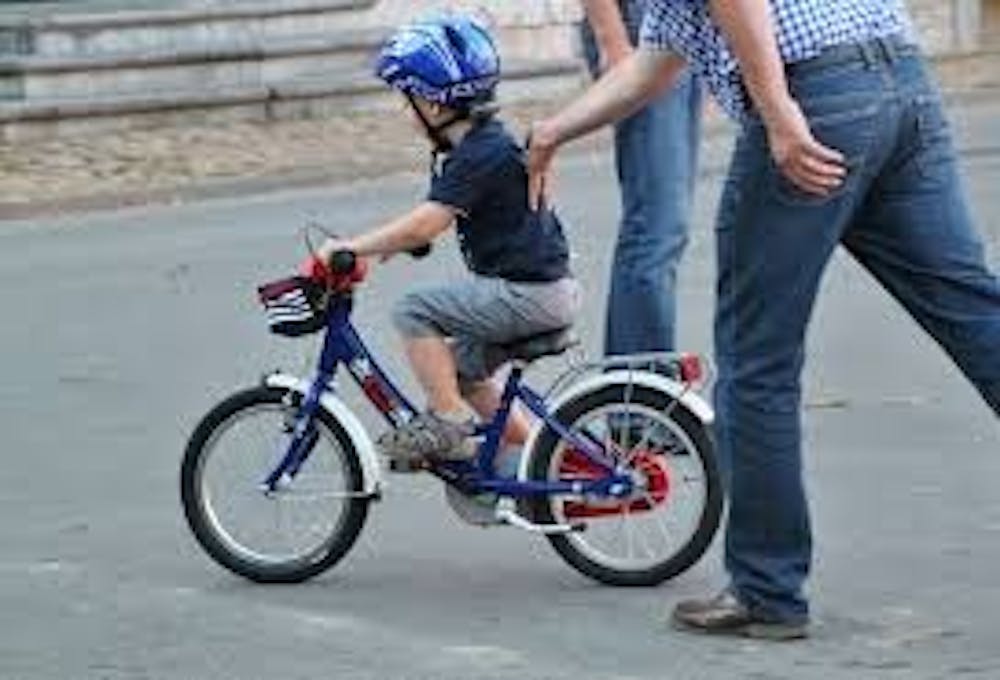I am 21 years old, and I don’t know how to ride a bike. Every day, when I run along the Schuylkill River Trail, seven–year–olds on bicycles—whose lives I have lived three times over—zoom past me. And even though I understand the basic physics that even bodies lacking stationary stability will remain upright when in motion, I can’t convince myself to actually lift my feet from the ground and pedal forward.
My 21st birthday was two days ago. Combined with the existential crisis that seems to hit me every summer, it got me thinking about what it means to act my age. In another life, this might have meant acting hirable or even marriageable. Certainly it would have meant constricting myself to fit a very specific role in society. In this life, however—the free and privileged one that I and so many Penn students live—I’m not so sure. We are people in limbo between staying under the authority of our adult parents and professors and becoming adults ourselves. And of course, we imagine ways to measure our adultness. Like the way we dress. The way we socialize. The way we spend. The way we work. The way we eat.
The other day, my housemates and I were hanging out in the kitchen. I was making veggie burgers from scratch, loosely following a recipe I’d found on spoonuniversity.com. Bre and Victoria sat at the table, eating cherry tomatoes from plastic packaging and debating heatedly whether ramen noodles taste better raw or cooked. Victoria was adamant that raw is better.
“Raw is good,” said Bre. “I’m just not sure if it’s better, you know?”
I felt superior as my hands kneaded that squidgy ball of black bean Play–Doh. I felt like an adult. Because I never eat instant noodles, or instant Mac ‘n’ Cheese, or instant anything. But the truth is that I’ve also never had a “real” job with a concrete time commitment and a steady payroll and a dress code like they and many of my peers have. This summer, I’m working as a freelance intern for a West Philly newspaper, living the ascetic life of a starving artist—except for the fact that my parents are paying for my housing. And my food. And the drinks and decorations for my birthday party. Cue the aforementioned summertime existential crisis in which I wonder whether I’m actually cut out to succeed in my chosen career, support a decent lifestyle, claim independence and act my age.
Maybe that’s the curse of college students who constantly challenge themselves: we never get to feel like we know what we’re doing. At our core, we are all 21–year–olds who can’t ride a bike. We’re all successful interns who haven’t figured out how to work the old–fashioned coffee maker in the office. We’re all people who make healthy veggie burgers for dinner, then stop at Allegro’s when our night out is over. We attend our classes, internships, jobs, or whatever endeavor in which we intend to overachieve that day, and act as if we are right where we ought to be at this point in our lives. And maybe the day when we finally put on that mask and never take it off again is the day that we become adults.
It’s a depressing notion. I hate to think that adulthood is not about facing reality, but about putting a face on for reality—the reality that most of us need to apply for about 50 internships just to get a response, that we’re behind where we want to be on our career path and that, realistically, New York after graduation isn’t an option for our finances. Even though we grew up with enough, or more than enough—or, for some of us, too much to feel happy with what we’ve accomplished for ourselves.
Poor me, I know. In the grand scheme of things, I am fortunate, privileged, well off. And yet I can still look at my resume, in the mirror, at my life and feel as if I’m not doing well enough. As if who I am and what I’ve done is too little compared to the number of years my real and now legally acceptable ID says I’ve had to accomplish them.
I don’t know what it means to be an adult, I don’t know if I am one and I don’t know if I’ll ever be ready to act like one. But I do know that I’ve managed to get to where I am today without riding a bike, which sort of debunks the obvious metaphorical significance of the fact that I can’t. We all impose narratives on our lives with causes and effects and real–life metaphors that provide explanations for why we are who we are, and that reduce us to a mere combination of our accomplishments and, frankly, our excuses. But the truth is that we’re all still so young. Even I, the 21–year–old almost–junior, am so young. We’re so young. It’s time we start acting like it.

